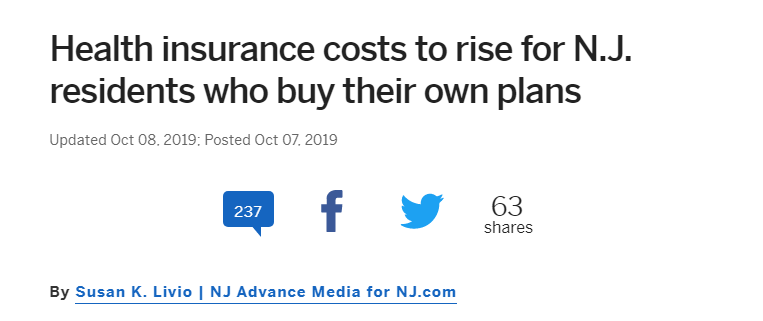皆さまも良く耳にしてるんじゃないかと思いますが、アメリカでは医療費がとても高いです。
旅行するなら必ず保険に入っておかないとだめだと言われていますよね。
アメリカ人の方々もきっと困っているんじゃないかと想像できます。
そこで、今回は、ローカル紙にのっていた医療保険料値上げの記事を読んでみたいと思います。
ニュージャージー州の主な健康保険団体は四つあるようで、保険団体が病院を紹介したり医師への医療技術提供を行うなど、金銭での保険給付以外での活動が多くあることや、保険団体が複数存在し、保険料率が団体ごとに異なるのがとても大きな特徴と思われました。以下、概訳をご覧ください。

New Jerseyans who buy their own health insurance policies will pay higher premiums next year.
The rates will rise on average from 6.5 percent to 19 percent, depending on which of the four carriers they select, according the state Department of Banking and Insurance, which announced the changes Monday.
Premiums are rising in New Jersey and across nation largely because the price of medical care is going up. A federal health insurance tax is responsible for 2.7 percent of the increase, the department said.
But it could have been a lot more expensive had Gov. Phil Murphy and the state Legislature not enacted two laws that stabilized the individual insurance market, supported by the Affordable Care Act, the landmark health care law, the department said.
State officials say these laws have saved those enrolled in the health insurance programs about 22 percent over two years.
One law preserved the “individual mandate” — the requirement under the ACA that required people to buy a health plan if they were not covered through their jobs or face a fine at tax time. Having more people in the insurance pool lowers rates because costs are shared. The individual mandate was eliminated at the federal level in the tax overhaul passed by Republican-controlled Congress and signed by President Trump.
The other law created a reinsurance program, a reimbursement system that protects insurers from very high claims, which began this year.
About 315,000 residents buy health coverage through the individual insurance market, the department said.
“New Jersey has worked proactively to push back against the federal government’s attacks on the Affordable Care Act and to stabilize the insurance market," Banking and Insurance Commissioner Marlene Caride said.
Rate changes were also announced for the state’s Small Employer Health Coverage Program, which allows small businesses to offer insurance to their employees. These workers could pay as much as 10.6 percent more — or save about 3 percent if they sign with Horizon Blue Cross Blue Shield of New Jersey, according to the department’s announcement.
“These 2020 rates demonstrate the progress we’re making by giving doctors new and better tools to improve the quality of care they provide our members and then empowering those members to more conveniently get the right care, in the right setting, at the right time so they can achieve their best health," Horizon spokesman Tom Vincz said.
The Murphy administration has begun the process for the state to run New Jersey’s own health exchange, the online marketplace at healthcare.gov listing plan offerings and the subsidies available to lower premiums if people’s earnings do not exceed four times the federal poverty rate.
"Transitioning to a State-Based Exchange will give the state greater control over our health insurance market and the ability to take additional actions to ensure New Jersey families get the care that is critical to their health and well-being,” Caride said.
Average premium increases for the individual plans are 18.9 percent from Oxford; 16.8 percent from Oscar; 11 percent from AmeriHealth; and 6.5 percent from Horizon.
The average premiums for small employers health coverage policyholders are expected to rise 10.6 percent under Oxford; 9.4 percent under Oscar; 0.8% under AmeriHealth and decline 3.3% under Horizon, the department said.
Correction: An earlier version of this story said premiums were rising again from the previous year. Premiums declined by 9.3% in 2019.
Susan K. Livio may be reached at slivio@njadvancemedia.com. Follow her on Twitter @SusanKLivio. Find NJ.com Politics on Facebook.
ニュージャージー州で、個人健康保険料が値上げ
州民の健康保険料が来年から値上げされる。月曜日の州当局の発表によれば加入する健保団体により6.5~19%の幅での値上がりとなります。
ニュージャージー州および全国で保険料が上昇しているのは、主に医療の価格が上昇しているためです。 連邦健康保険税の影響は2.7パーセントだけです。
しかし、マーフィー州知事と州議会が、オバマケアに後押しされた二つの法律を作っていなければ、はるかに高額だったかもしれません。この二つの法律は個人保険市場の安定化にとても役立っています。
州当局は、これらの法律により、健康保険加入者の保険料を、2年間で約22%低減できたと言っています。
勤務先の会社を経由して健康保険に加入できなかった場合は、個人での健康保険加入をACAでは義務つけています。 保険制度は加入者が多くなると、費用分散され、保険料が下がる効果があります。
共和党政権下の連邦政府レベルでは個人強制加入の制度は廃止されています。
もう1つの法律は、再保険プログラムを作成しました。これは、保険団体を超高額な保険請求から保護する補償システムで、今年から始まりました。
当局によると、約315,000人の住民が個人保険市場を通じて健康保険に加入しています。
「ニュージャージー州は、オバマケアに対する連邦政府見解に反対し、個人保険市場を安定させるために積極的に取り組んできました」と、州当局は言っています。
また、州の小規模雇用主健康保険プログラムの料金変更も発表されました。これにより、中小企業は従業員に保険を提供できます。 部門の発表によると、これらの労働者の保険料は10.6%値上がりするところだったが、ニュージャージー州のHorizon Blue Cross Blue Shieldに加入することで逆に約3%値下げできます。
「2020年の改定保険料率により、ケアの質を向上させるための新しいより優れたツールを医師に提供でき、加入者は適切なタイミングで適切なケアをより便利に受けることができるようになる」と、Horizonの広報担当者は述べています。
マーフィー知事は、ニュージャージー州独自のオンラインによる個人健康保険市場の運営に着手しました。そこでは保険加入者の収入が所得制限を超えないかぎり、保険料を下げる事が可能になります。
「個人健康保険市場が州ベースへ移行されることにより、州は健康保険市場をより強力に管理できるようになり、ニュージャージー州の人々がケアを確実に受けられるようにするための追加措置を講じることができるようになります」と州当局は言っています。
各健康保険団体ごとの平均保険料値上げ率は、オックスフォードが18.9%、 オスカー16.8%、 AmeriHealth11%、 Horizon6.5%となります。
小規模事業健康保険について平均保険料はオックスフォードでは10.6%、 オスカーでは9.4パーセント、AmeriHealthでは0.8%値上げと予想されています。ところが、Horizonでは3.3%の値下げと言われています。